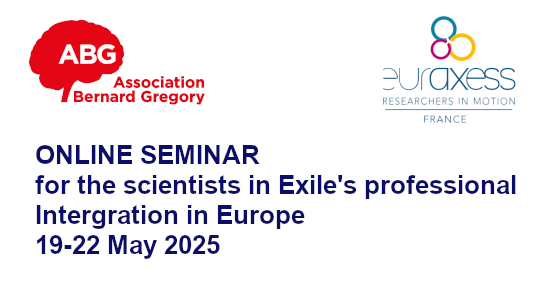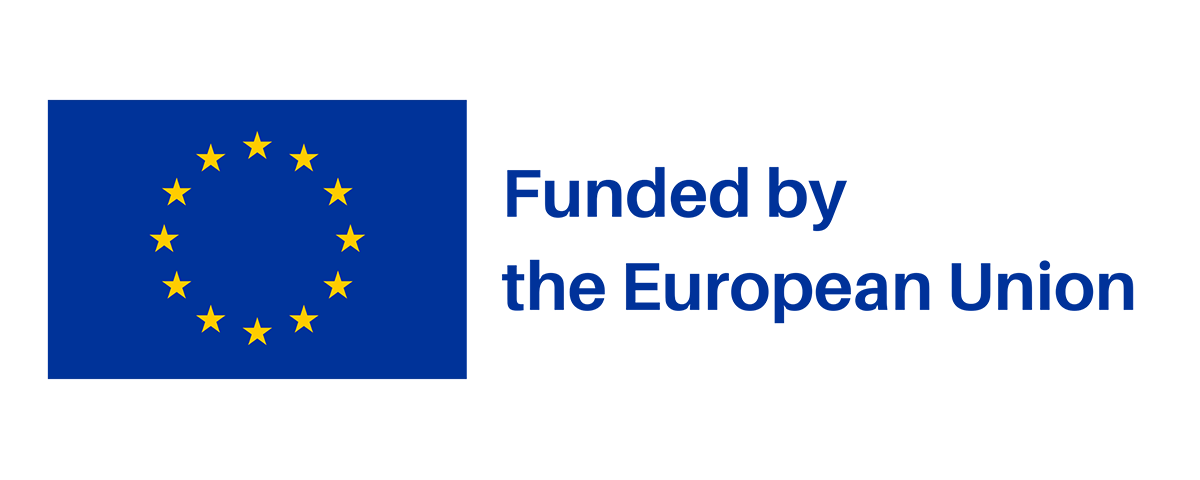

The Euraxess Seminar for Scientists in Exile, facilitated by ABG, was held online from May 19-22, bringing together for the first time in this format international researchers based in different European countries. This initiative was specifically aimed at researchers in exile situations, across all disciplines, aspiring to rebuild their professional careers in Europe, outside the academic sector. Discover in this article the key moments of this seminar, the participants’ feedback, as well as the advice from the speakers for international researchers.
By Tania Suvorova
The current geopolitical situation has forced many talented researchers to leave their home countries. These scientists face unique challenges in their professional reconstruction within a new cultural environment, including validation of skills acquired in their countries of origin, navigation of European recruitment systems, and adaptation to local professional codes.
At the European level, numerous reception programs exist for these researchers, such as the PAUSE Program (France), the Philipp Schwartz Initiative (Germany), the Scholars at Risk network (International), MSCA4Ukraine (European scale), the Gerda Henkel Foundation (Germany), the CSIC Scientific Cooperation Program with Ukraine (Spain), the Volkswagen Foundation Support Program (Germany), Academy in Exile (Germany), and the Hamburg Program for Researchers at Risk (Germany). These support programs often offer temporary research contracts, allowing researchers to settle in a European country and continue their scientific activities while strengthening the international dimension of the host institution.
In continuity with these initiatives, this seminar is part of the European Union's Horizon Europe program, within the ERA TALENT project, illustrating European commitment to more sustainable professional integration of scientific talents in exile. Thus, actors working on this theme — ABG, Euraxess and its Science4Refugees Hub (a network of Euraxess centers specialized in welcoming researchers in exile) — have joined forces to strengthen European actions and open doors to the socio-economic sector.
ABG, recognized for its expertise in supporting PhDs towards employment, has been accompanying researchers in exile settled in France since 2018 through the PAUSE program on career development issues. Thanks to its international experience, it also offers support resources for researchers in exile settled in other European countries.
Euraxess is a European Commission initiative created to facilitate international mobility and career development for researchers in Europe. It provides an online platform that centralizes scientific job offers and funding opportunities, as well as practical information for settling in a new country: administrative procedures, housing, social security, schooling, etc.
Within this system, Science4Refugees is a specific initiative dedicated to researchers in exile or refugees. It aims to facilitate their integration into European institutions by connecting researchers and employers, offering adapted resources (training, career advice, information on research opportunities) and promoting inclusive practices in universities and research centers.
18 participants of different levels — PhD students, postdocs, but also confirmed researchers — followed the intensive 3.5-day program, which combined several components:
Professional Project Development: Participants worked on designing a personalized professional project, exploring opportunities in the European job market.
Networking and Communication: Sessions covered developing an effective personal pitch, professional networking strategies, and understanding European multicultural environments.
Recruitment Processes: Particular attention was paid to the specificities of hiring procedures outside academia and adapting applications to different European national markets.
ABG's pedagogical team mobilized three career advisors, all former researchers with backgrounds in physics, biology, and management, each bringing valuable international expertise. This peer-to-peer approach ensures empathetic understanding of academic challenges while offering practical job market expertise.
The content was particularly adapted to participants' geographical aspirations. Analysis of expressed preferences revealed that the United Kingdom, Germany, France, and the Netherlands constitute the main destinations of professional interest.
Participant profiles reveal the geographical and disciplinary diversity of this scientific community in exile. Germany and France represented the main host destinations, followed by Belgium, Spain, Austria, and other European countries.
Disciplinary diversity is equally remarkable with participants from natural and physical sciences, social sciences and humanities, demonstrating that scientific exile crosses all disciplines.
The event included a 100% online round table, open to the wider public, dedicated to PhD careers outside the academic world in different international environments.
Check our YouTube channel to watch more than an hour of rich and inspiring exchanges, with five speakers who made their PhD a springboard to strategic, operational, or scientific positions in the private sector.
Panel discussion "PhD Careers beyond Academia" [ABG-Euraxess online seminar for exiled researchers]
ABG warmly thanks the speakers who took the time to share their experience of transitioning to non-academic careers:
"I really liked the main idea as it made me feel seen as an exiled researcher in Europe. I think we can do more for talented people in exile, as it's a win-win situation."
"The European dimension of the seminar significantly enhances its impact by offering a broader, more inclusive perspective on the challenges and opportunities faced by scientists in exile."
"The seminar provided a comprehensive and practical overview of transitioning from academia to industry. I especially appreciated the hands-on sessions on the STAR method, personal pitching, and understanding the job market across European countries."
Beyond practical tools, the seminar provided crucial psychological support:
"It was like talking to relatives, but nice relatives, the ones who can really help, the ones who really care."
"I think I will remember this workshop as a game changer of my life."
If you would like to organize a similar training program to support PhD candidates or postdocs in developing their careers, please contact us for more information:
Dr. Kristina Berkut – Head of International Cooperation
kristina.berkut@abg.asso.fr
This project has received funding from the European Union's Horizon Europe research and innovation programme within the framework of the ERA TALENT Project funded under grant agreement No 101103476.
